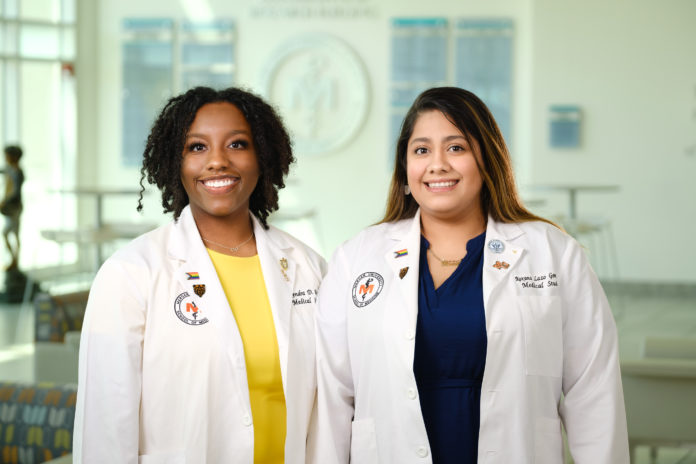
SAVANNAH – Mercer University School of Medicine (MUSM) second-year medical students Roxie Lazo Gonzalez and Kendra Moore have been elected as regional leaders in the Latino Medical Student Association (LMSA) and the Student National Medical Association (SNMA), respectively.
Gonzalez has been named co-director of the Latino Medical Student Association’s Southeast Region for 2021-2022. This region encompasses 10 states in the Southeast, plus Washington, D.C., Puerto Rico and the U.S. Virgin Islands. The LMSA is a nonprofit organization whose mission is to support current and future Latino students in caring and advocating for their community. Gonzalez currently serves as president of Mercer’s LMSA Chapter in Savannah, treasurer of Mercer’s SNMA Chapter in Savannah, and is a member of the American College of Physicians and Phi Delta Epsilon International Medical Fraternity.
Moore was elected 2021-2022 regional director-elect for SNMA Region IV, which includes five southeastern states and the Caribbean. She will serve as the SNMA Region IV regional director from 2022-2024. The SNMA is committed to supporting current and future underrepresented minority medical students, addressing the needs of underserved communities, and increasing the number of clinically excellent, culturally competent and socially conscious physicians. Moore is the current president of Mercer’s SNMA Chapter in Savannah, serves on the executive board for Mercer’s Student Organization for the Advancement of Research and Service and MUSM Savannah’s Pediatrics Interest Group, and is a member of the American Academy of Pediatricians, the Georgia Chapter of American Academy of Pediatrics, and the American Academy of Family Physicians.
Gonzalez and Moore have been involved in and have helped lead many programs focused on supporting underrepresented minority (URM) students at Mercer and addressing health disparities across Georgia. These important initiatives include: an anti-racism curriculum adopted into the MUSM first-year orientation, Latino health fairs in Macon and Savannah, the creation of URM representatives in the Office of Admissions, a Medical Spanish Crash Course, HBCU pipeline programs and more. Among these contributions, Gonzalez and Moore co-founded “The Bear Essentials,” a support program for URM students. This program includes a webinar series to support and mentor URM pre-medicine students across Georgia who are in the medical school admissions process.
“The steps Mercer is taking towards diversity and inclusion have made an impact on hundreds of URM students in Georgia – including many at Mercer, the Latino community and especially on me,” Gonzalez said. “Throughout the last year, I’ve gained skills that have better shaped my leadership style and will prove beneficial to the regional LMSA executive board.”
Moore added, “Our SNMA executive board has helped to create institutional changes that will impact Mercer for years to come. Now I want to expand my leadership to help benefit the region. In this role, I hope to gain more knowledge about SNMA and how I can use my leadership skills to create a new path and lay the foundation for those coming behind me.”
“WE ARE HONORED THESE STUDENTS ARE MERCERIANS AND GRATEFUL TO THEM FOR THEIR COMMITMENT TO THE MEDICAL SCHOOL’S MISSION…”
Jean Sumner, M.D., FACP, Dean of Mercer University School of Medicine
“The future of this state is so much brighter because of leaders like Kendra and Roxie who genuinely care. They are immensely talented, knowledgeable young women who demonstrate this concern and compassion through their work, not just words,” said Dr. Jean Sumner, dean of Mercer University School of Medicine. “We are honored these students are Mercerians and grateful to them for their commitment to the medical school’s mission of service to rural and underserved populations in our state. MUSM is committed to making a difference and is a national leader in rural health. We will continue to be a strong partner in this important work.”
Dr. Bonzo Reddick, MUSM faculty member and associate dean for diversity and inclusion, shared what this achievement will mean for Mercer: “I’m excited to know that, when students from the southeast region of the U.S. go to the regional conferences for SNMA and LMSA, the first voice they hear – the voice of leadership – will be from medical students at Mercer. They will be a great role model for pre-med students and other medical students, and they will also help Mercer to continue to build strong pipelines for underrepresented students.”
The contributions that Gonzalez and Moore have made to the Mercer community and to MUSM’s mission of service to all Georgians are innumerable and will have an impact on future medical students.
About Mercer University School of Medicine (Macon, Savannah and Columbus)
Mercer University’s School of Medicine was established in 1982 to educate physicians and health professionals to meet the primary care and health care needs of rural and medically underserved areas of Georgia. Today, more than 60 percent of graduates currently practice in the state of Georgia, and of those, more than 80 percent are practicing in rural or medically underserved areas of Georgia. Mercer medical students benefit from a problem-based medical education program that provides early patient care experiences. Such an academic environment fosters the early development of clinical problem-solving and instills in each student an awareness of the place of the basic medical sciences in medical practice. The School opened a full four-year campus in Savannah in 2008 at Memorial University Medical Center. In 2012, the School began offering clinical education for third- and fourth-year medical students in Columbus. Following their second year, students participate in core clinical clerkships at the School’s primary teaching hospitals: Medical Center, Atrium Health Navicent in Macon; Memorial University Medical Center in Savannah; and Piedmont Columbus Regional Hospital and St. Francis Hospital in Columbus. The School also offers master’s degrees in family therapy, preclinical sciences and biomedical sciences and a Ph.D. in rural health sciences.








